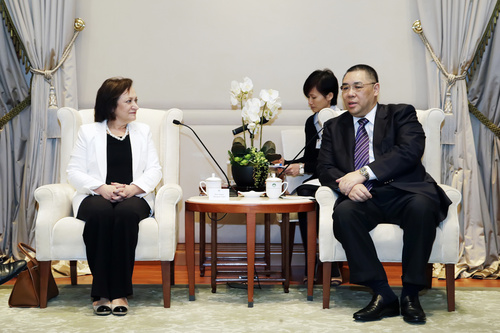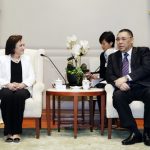 Chief Executive, Mr Chui Sai On, meets with the Prosecutor-General of the Portuguese Republic, Ms Joana Marques Vidal.
Chief Executive, Mr Chui Sai On, meets with the Prosecutor-General of the Portuguese Republic, Ms Joana Marques Vidal.
The Chief Executive, Mr Chui Sai On, said the continuation of bilateral cooperation with the Portuguese Republic on judicial and legal matters was greatly significant for Macao. This was in the view of the history between Macao and Portugal and the friendly relations between the Macao Special Administrative Region (SAR) and the Portuguese Republic, he said. Mr Chui’s comments were made on Monday (18 April) during a meeting at the Government Headquarters with the Prosecutor-General of the Portuguese Republic, Ms Joana Marques Vidal. Mr Chui said he hoped the system – whereby judges and prosecutors from Portugal come to Macao to assist in justice administration – could be continued. Over the years, Portuguese judges and prosecutors had won wide recognition from the community for their professionalism. Since the establishment of the SAR, Macao and Portugal had signed several agreements on legal and judicial cooperation. There is also ongoing cooperation with the European Union – of which Portugal is a member – regarding education and training in legal affairs. The Government highly values the principle of judicial independence, as it is a cornerstone of Macao’s development, Mr Chui said. Mr Chui also expressed his gratitude for the administrative support provided by Portugal’s public prosecution system since the establishment of the SAR. Ms Vidal said – in a message from the High Council of the Public Prosecution Office – that Portugal would continue sending judges and prosecutors to Macao. She said Macao and Portugal would further extend links on judicial and legal matters, such as in the training of local prosecutors and the strengthening of judicial cooperation. She stated that the independence of the judiciary from other branches of government is also important in Portugal, adding that she was pleased to know the SAR Government and the Chief Executive paid great attention to such matters. The Secretary for Administration and Justice, Ms Chan Hoi Fan, also attended the meeting, and expressed her pleasure that Portuguese judges and prosecutors would continue to come to Macao. This would help develop exchanges between Portugal and Macao on legal matters. The Public Prosecutor-General of Macao, Mr Ip Son Sang, who was also at Monday’s meeting, said governance according to law and respect for judicial independence provided the necessary strong framework for the Public Prosecutions Office to fulfil its duties. Macao officials also at the meeting included the Chief-of-Office of the Chief Executive’s Office, Ms O Lam, and the Chief of Office of the Public Prosecutions Office, Mr Tam Peng Tong. Portugal’s representatives at the meeting included: the Consul General of the Consulate-General of Portugal in Macao, Mr Vítor Sereno; the Director of the Central Department of Investigation and Prosecution and Deputy Prosecutor-General of the Portuguese Republic, Mr Amadeu Francisco Ribeiro Guerra; member of the High Council of the Public Prosecution Office and Deputy Prosecutor-General, Jorge Manuel Alves de Oliveira; and the Chief of Office of the Prosecutor-General’s Office, Ms Helena de Jesus Fernandes Gonçalves, who is also a public prosecutor. After the meeting with the Chief Executive, the delegation representing Portugal’s Public Prosecution Office also met Mr Ip Son Sang in the headquarters of Macao’s Public Prosecutions Office. Today (19 April), the delegation is scheduled to have a meeting with Ms Chan Hoi Fan and another with the President of the Court of Final Appeal, Mr Sam Hou Fai. The delegation will additionally visit the Legal and Judicial Training Centre and courts in Macao. The delegation will leave for Beijing tomorrow (20 April), concluding its five-day visit in Macao.


